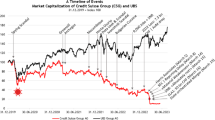Abstract
The impact of the great financial crisis that started in the United States with the implosion of “subprime” loans has drawn the public’s attention on one of the most innovative branches of financial market, the famous derivatives. The financial crisis and the involvement of major banking institutions thus call for some thinking about the concept of control in Italy and in a globalized world. In Italy, even though the scale of the risks connected with transactions in derivatives is limited, some banks may have damaged their reputations by pushing complex derivative products onto unwitting clients. Apart from reassurance and all kinds of justifications, and without arguing whether this was deliberate or not, the monetary authorities, Consob, and ABI have clearly reported the risk of a world financial crisis too late.
Similar content being viewed by others
Notes
Derivatives are defined as Over The Counter (OTC) if implemented directly by two counterparts tied by a contract fully adjustable according to the respective needs. Due to this flexibility, often connected with the presence of complex clauses, the value and the risk of most OTC derivatives are often difficult to assess. Such instruments are thus different from listed derivatives, whose value is traded on an official market through standard contracts, and having a centralized entity as their counterpart. Listed derivatives are indeed base contracts (futures, options, swaps), whose value and risk can be inferred.
Bank for International Settlements, BIS, Quarterly Review, September, 2008, Basel.
Scholes M. and Merton R. received the Nobel Prize in 1997 motivated as follows: “for a new method to determine the value of derivative instruments”.
The Securities and Exchange Commission (SEC) is in charge of supervising, among others, the US investment banks.
Iceland had to take control of the main national bank and completed the third nationalization of a credit institution over few days. All stock exchange trading has been suspended and the country’s financial system is under “bankruptcy risk”. The financial crisis is rampant on the Island, whose banks have expanded abroad, and investors have ensured high yields on the Icelandic currency to fund the local economy.
Interactive Financial Data Service, S.r.l. Rome, a company that also provides data to Consob.
6th Finance Commission of the Chamber of Deputies, “Indagine conoscitiva sulle problematiche relative alla diffusione di strumenti finanziari derivati,” Rosati A., General Consob Official, January 12, 2005.
“Derivati e informazioni ai clienti: Consob censura Italease, Il Sole 24 ore, October 27, 2007; Grassoni A., Italease: i segreti dei contratti truffa, Il Sole 24 ore, Finanza e mercati, January 28, 2008.
D’Angerio V., ibid.
The Mediobanca survey covers the 1984-2006 period and reports data on the 1200 main funds and joint-stock companies with variable capital established under the Italian law.
Center for Financial Studies, Bankers’ Meeting in Frankfurt, November 22, 2007.
Report of the Governor of the Bank of Italy, Closing remarks at the meeting of the Bank of Italy, 31/5/2008, Rome.
Audition of the Governor of the Bank of Italy M. Draghi during the works of the International Monetary Fund, Washington, October 11, 2008.
Audition of the Governor of the Bank of Italy M. Draghi at the 6th Commission of the Senate of the Republic, “Un sistema con più regole, più capitale, meno debito, più trasparenza,” Rome, October 21, 2008.
CDO: Collateralized Debt Obligations: with these derivatives, the bank does not only need its own capital and therefore tends to transfer the credit risk (protection buyer) and the creditor to whom this risk refers (reference).
The European Directive MiFID (2004/39/EC) is part of the Financial Services Action Plan (FSAP) which came into force on November 1, 2007.
References
Alletto A, Bertoletti P, Di Benedetto A, Wang MJ (2008) Il ruolo della Banca d’Italia nella crisi finanziaria, Valore medio premi Credit Default Swap (brokers’ risk index perceived by the market, September 2008 data. Base points: Italy 87, Europe 141, US 286). http://economia.unipr.it/docenti/Schwizer/docs
Barocci P (2008) La crisi finanziaria, le banche italiane e i risparmiatori, Free Lance International Press Association, Italy, July 24, 2008. http://www.flipnews.org/
Barucci E, Ferri G (2008) La FED dal trionfo alla crisi dei subprime. In: Il Riformista, August 7, 2008
Borzi N (2007) I derivati dei Comuni, un identikit che cambia. In: Il Sole 24 ore, Finanza e mercati, October 27, 2007
Bufacchi I (2007) Ora controlli più severi sul cattivo uso di derivati. In: Il Sole 24 ore, Finanza e mercati, July 7, 2007
D’Angerio V (2008) Tornano di moda i bond. In: Plus 24 Ore, Il Sole 24 ore, February 9, 2008
Di Biase A (2007) Italease non poteva vendere derivati. In: Milano Finanza, July 25, 2007
Faissola C (2008) Indagine conoscitiva sulla crisi finanziaria internazionale e i suoi effettti sull’economia italiana, Audition at the 6th Commission of the Senate of the Republic (Finance and Treasury), October 28, 2008
Krugman P (2008) Fannie, Freddie and You. The New York Times, July 14
Margiocco M (2008) Greenspan fa ammenda. Il guru si è sbagliato. In: Il Sole 24 ore, Finanza e Mercati, October 23, 2008
Scholes M (1998) Derivatives in a dynamic environment. Am Econ Rev 88(3):350–370
Zamagni S (2008) La lezione e il monito di una crisi annunciata. In: Workshop of the Department of Economic Sciences, Bologna State University, October 26, 2008
Author information
Authors and Affiliations
Corresponding author
Rights and permissions
About this article
Cite this article
Tagliabue, G. The role of controls in the international financial crisis. Int Rev Econ 56, 303–313 (2009). https://doi.org/10.1007/s12232-009-0079-4
Published:
Issue Date:
DOI: https://doi.org/10.1007/s12232-009-0079-4




